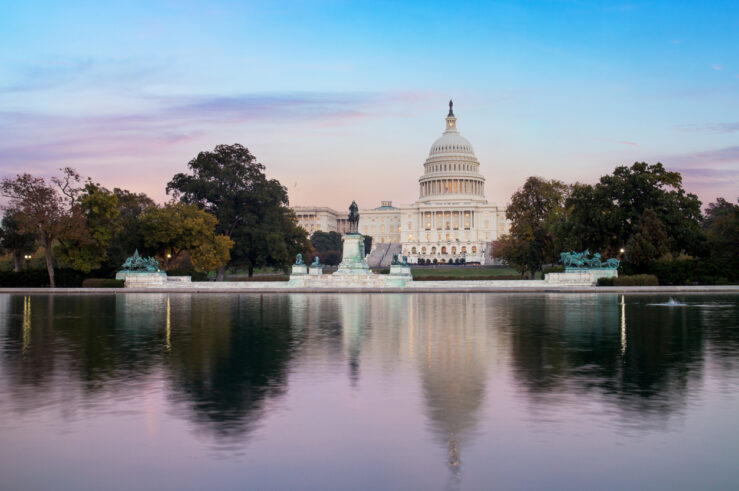Showing results for: “google”
AICOA: An Affront to the Rule of Law
The fate of the badly misnamed American Innovation and Choice Online Act, S. 2992 (AICOA), may be decided by the August congressional recess. AICOA’s serious flaws have been ably dissected by numerous commentators (see, for example, here, here, here, and here). Moreover, respected former senior Democratic antitrust enforcers who have advocated more aggressive antitrust enforcement ... AICOA: An Affront to the Rule of Law
The Competition and Transparency in Digital Advertising Act Is Fatally Flawed
The Competition and Transparency in Digital Advertising Act (CTDAA), introduced May 19 by Sens. Mike Lee (R-Utah), Ted Cruz (R-Texas), Amy Klobuchar (D-Minn.), and Richard Blumenthal (D-Conn.), is the latest manifestation of the congressional desire to “do something” legislatively about big digital platforms. Although different in substance from the other antitrust bills introduced this Congress, ... The Competition and Transparency in Digital Advertising Act Is Fatally Flawed
How Tech Startups Could Be a Casualty of the War on Self-Preferencing
We will learn more in the coming weeks about the fate of the proposed American Innovation and Choice Online Act (AICOA), legislation sponsored by Sens. Amy Klobuchar (D-Minn.) and Chuck Grassley (R-Iowa) that would, among other things, prohibit “self-preferencing” by large digital platforms like Google, Amazon, Facebook, Apple, and Microsoft. But while the bill has ... How Tech Startups Could Be a Casualty of the War on Self-Preferencing
NetChoice, Net Neutrality, and the Future of the First Amendment Online
In an expected decision (but with a somewhat unexpected coalition), the U.S. Supreme Court has moved 5 to 4 to vacate an order issued early last month by the 5th U.S. Circuit Court of Appeals, which stayed an earlier December 2021 order from the U.S. District Court for the Western District of Texas enjoining Texas’ ... NetChoice, Net Neutrality, and the Future of the First Amendment Online
The FTC UMC Roundup – May 27 Edition
Welcome to the Truth on the Market FTC UMC Roundup for May 27, 2022. This week we have (Hail Mary?) revisions to Sen. Amy Klobuchar’s (D-Minn.) American Innovation and Choice Online Act, initiatives that can’t decide whether they belong in Congress or the Federal Trade Commission, and yet more commentary on inflation and antitrust, along ... The FTC UMC Roundup – May 27 Edition
The Market Challenge to Populist Antitrust
The wave of populist antitrust that has been embraced by regulators and legislators in the United States, United Kingdom, European Union, and other jurisdictions rests on the assumption that currently dominant platforms occupy entrenched positions that only government intervention can dislodge. Following this view, Facebook will forever dominate social networking, Amazon will forever dominate cloud ... The Market Challenge to Populist Antitrust
Chair Khan’s Latest Flawed Perspective on Mergers Ignores Empirics and Sound Economics
Federal Trade Commission (FTC) Chair Lina Khan missed the mark once again in her May 6 speech on merger policy, delivered at the annual meeting of the International Competition Network (ICN). At a time when the FTC and U.S. Justice Department (DOJ) are presumably evaluating responses to the agencies’ “request for information” on possible merger-guideline ... Chair Khan’s Latest Flawed Perspective on Mergers Ignores Empirics and Sound Economics
The ABA’s Antitrust Law Section Sounds the Alarm on Klobuchar-Grassley
Sens. Amy Klobuchar (D-Minn.) and Chuck Grassley (R-Iowa)—cosponsors of the American Innovation Online and Choice Act, which seeks to “rein in” tech companies like Apple, Google, Meta, and Amazon—contend that “everyone acknowledges the problems posed by dominant online platforms.” In their framing, it is simply an acknowledged fact that U.S. antitrust law has not kept ... The ABA’s Antitrust Law Section Sounds the Alarm on Klobuchar-Grassley
Attention Markets: They Know Them When they See Them
A raft of progressive scholars in recent years have argued that antitrust law remains blind to the emergence of so-called “attention markets,” in which firms compete by converting user attention into advertising revenue. This blindness, the scholars argue, has caused antitrust enforcers to clear harmful mergers in these industries. It certainly appears the argument is ... Attention Markets: They Know Them When they See Them
Assessing Less Restrictive Alternatives and Interbrand Competition in Epic v Apple
The International Center for Law & Economics (ICLE) filed an amicus brief on behalf of itself and 26 distinguished law & economics scholars with the 9th U.S. Circuit Court of Appeals in the hotly anticipated and intensely important Epic Games v Apple case. A fantastic group of attorneys from White & Case generously assisted us ... Assessing Less Restrictive Alternatives and Interbrand Competition in Epic v Apple
In Apple v Epic, 9th Circuit Should Remember that Antitrust Forbids Enhancing, not Exercising, Market Power
On March 31, I and several other law and economics scholars filed an amicus brief in Epic Games v. Apple, which is on appeal to the U.S. Court of Appeals for Ninth Circuit. In this post, I summarize the central arguments of the brief, which was joined by Alden Abbott, Henry Butler, Alan Meese, Aurelien ... In Apple v Epic, 9th Circuit Should Remember that Antitrust Forbids Enhancing, not Exercising, Market Power
Call for Submissions on FTC UMC Rulemaking Authority
The Limits of FTC UMC Rulemaking Symposium There is widespread interest in the potential tools that the Biden administration FTC may use to address a range of competition-related and competition-adjacent concerns. Among other issues, there have been indications that the FTC may use its broad UMC authority under Section 5 of the FTC Act to ... Call for Submissions on FTC UMC Rulemaking Authority
















